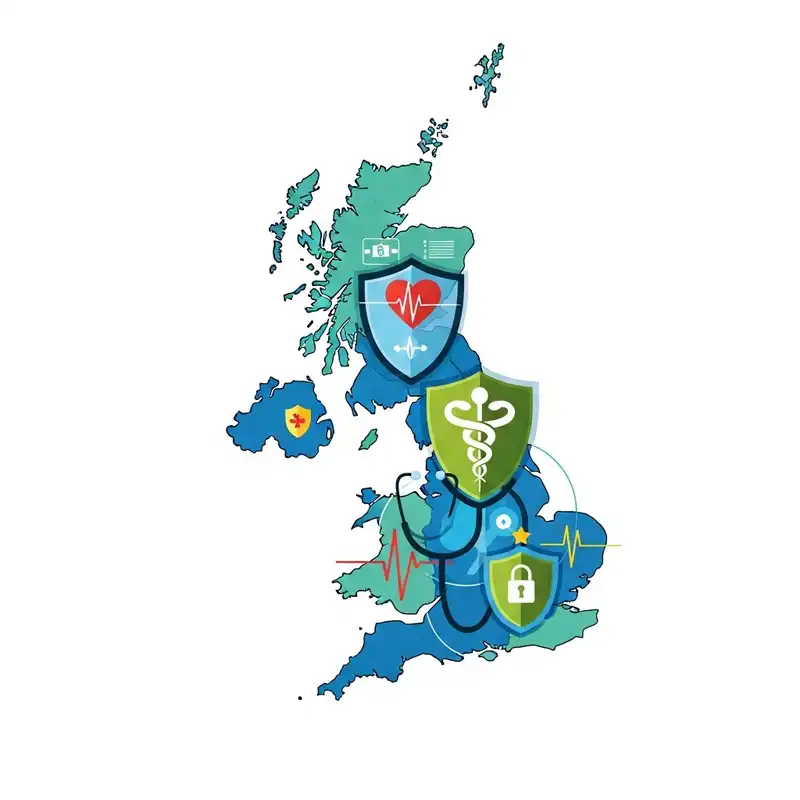Barium Swallow and Meal Tests

As an FCA-authorised expert with over 900,000 policies arranged, WeCovr explains how Barium Swallow and Meal tests work and how private medical insurance can provide rapid access to these vital diagnostic procedures in the UK. We’ll guide you through the process, from symptoms to diagnosis, ensuring you have complete clarity.
WeCovr explains diagnostic tests and how PMI can cover them
Navigating health concerns can be a stressful time, especially when you’re faced with symptoms like persistent heartburn, difficulty swallowing, or unexplained stomach pain. Your GP might suggest a diagnostic test to get to the root of the problem, and two of the most common procedures for investigating the upper digestive system are the Barium Swallow and Barium Meal.
But what exactly are these tests? And if you need one, how can you get one quickly?
This is where private medical insurance (PMI) comes in. While the NHS provides excellent care, waiting lists for diagnostic tests can sometimes be long. PMI offers a parallel path, giving you faster access to specialists and tests, often within days. In this comprehensive guide, we'll break down everything you need to know about barium tests and how your private health cover can help you get the answers you need, sooner.
What are Barium Swallow and Barium Meal Tests?
Think of a barium test as a special kind of X-ray that uses a contrast agent to make parts of your digestive tract show up clearly on screen. The "contrast" is a safe, chalky liquid called barium sulphate. When you drink it, it coats the lining of your oesophagus, stomach, and small intestine, allowing a radiologist to spot any abnormalities that a standard X-ray would miss.
These tests are crucial for diagnosing a wide range of conditions affecting your upper gastrointestinal (GI) tract.
Barium Swallow (Oesophagogram)
A Barium Swallow focuses specifically on your pharynx (the back of your throat) and your oesophagus (the tube that carries food from your throat to your stomach).
It helps doctors investigate:
- Dysphagia: Difficulty or pain when swallowing.
- Hiatus Hernia: When part of your stomach pushes up through your diaphragm.
- Gastro-oesophageal Reflux Disease (GORD): Severe or persistent acid reflux.
- Oesophageal Strictures: A narrowing of the oesophagus.
- Ulcers, polyps, or tumours in the oesophagus.
Barium Meal
A Barium Meal looks a little further down, examining your stomach and the first part of your small intestine, known as the duodenum.
It helps doctors investigate:
- Persistent upper abdominal pain.
- Unexplained vomiting or indigestion.
- Suspected stomach ulcers.
- Inflammation of the stomach lining (gastritis) or small intestine.
- Blockages, polyps, or tumours in the stomach or duodenum.
In some cases, your doctor may request a Barium Follow-Through, which tracks the barium's journey through your entire small intestine. This can take several hours but provides a complete picture of your small bowel.
| Test Type | Primary Focus Area | Common Reasons for Test | Typical Duration |
|---|---|---|---|
| Barium Swallow | Throat (Pharynx) & Gullet (Oesophagus) | Difficulty swallowing, severe reflux, chest pain | 15–30 minutes |
| Barium Meal | Stomach & First Part of Small Intestine | Abdominal pain, unexplained vomiting, suspected ulcers | 30–40 minutes |
| Barium Follow-Through | Entire Small Intestine | Suspected Crohn's disease, blockages, malabsorption issues | 2–6 hours |
Why Might a Doctor Recommend a Barium Test?
A GP or specialist will recommend a barium test when your symptoms point towards a potential issue in your upper digestive system. It’s a powerful, non-invasive way to get a clear look inside your body without needing surgery.
Common symptoms that could lead to a referral include:
- Persistent Heartburn: More than just occasional indigestion, this is a burning feeling in your chest that won't go away.
- Difficulty Swallowing (Dysphagia): A feeling that food is getting stuck in your throat or chest.
- Unexplained Upper Abdominal Pain: A constant or recurring pain that can’t be easily explained.
- Nausea or Vomiting: Especially if there's blood in your vomit or it happens frequently.
- Feeling Full Quickly: Getting full after eating only a small amount of food.
- Unexplained Weight Loss: Losing weight without changing your diet or exercise routine.
Real-Life Example: Imagine Sarah, a 45-year-old teacher, has been experiencing a nagging pain in her upper abdomen and frequent, painful acid reflux for several months. Over-the-counter remedies aren't working. Her GP is concerned it could be a stomach ulcer or a hiatus hernia. To get a definitive diagnosis, the GP refers her for a Barium Meal.
The Barium Test Procedure: A Step-by-Step Guide
The thought of any medical test can be daunting, but a barium test is a straightforward and generally painless procedure. Knowing what to expect can help ease any anxiety.
1. Before the Test Preparation is simple but important. You'll be asked to fast – meaning no food or drink – for several hours before your appointment, typically from the night before. This ensures your stomach and oesophagus are empty, allowing the barium to coat the lining properly for the clearest possible images. You should also avoid smoking or chewing gum.
2. During the Test You’ll be taken to an X-ray room and asked to change into a hospital gown. The procedure is carried out by a radiologist or a radiographer.
- The Barium Drink: You'll be given a cup of the barium liquid to drink. It's often thickened and may be flavoured (like a milkshake) to make it more palatable, but it can have a chalky texture.
- The X-ray Machine: You will stand or lie on an X-ray table that can be tilted into different positions. This helps the barium flow and coat all the areas that need to be examined.
- Taking the Images: As you swallow the barium, the radiologist will watch its progress on a monitor and take a series of X-ray images or a short video (fluoroscopy). You may be asked to hold your breath or turn into different positions. For a Barium Meal, you might also be given some bicarbonate powder and citric acid to create gas in your stomach, which helps expand it for a clearer view.
The entire process for a Barium Swallow or Meal usually takes less than 40 minutes.
3. After the Test Once the test is over, you can eat and drink as normal. The most important advice is to drink plenty of water for the next 24-48 hours. This helps flush the barium out of your system and prevents constipation, which is the most common side effect.
Don't be alarmed if your stools are white or pale for a day or two – this is completely normal as your body expels the barium.
Accessing Barium Tests: NHS vs. Private Healthcare
When you need a diagnostic test, how quickly you can get it often depends on whether you use the NHS or private healthcare.
The NHS Pathway
- GP Appointment: You visit your GP to discuss your symptoms.
- Referral: If your GP thinks a barium test is necessary, they will refer you to a hospital's radiology department or to a specialist gastroenterologist.
- Waiting List: This is where delays often occur. You will be placed on a waiting list for the test.
According to the latest NHS England statistics, the target is for 95% of patients to wait no more than 6 weeks for a diagnostic test after a referral. However, in early 2025, data showed that this target was frequently missed, with a significant number of patients—sometimes over 20%—waiting longer than 6 weeks for key tests like barium swallows and endoscopies. For a specialist consultation before the test, the wait can be even longer.
The Private Pathway (with PMI)
- GP Referral: Most UK private medical insurance providers require a GP referral to ensure the test is medically necessary. Some now offer digital GP services that can provide this quickly.
- Authorisation: You call your insurer to get the consultation and test pre-authorised.
- Appointment: You can book an appointment with a private specialist, often within a few days. The specialist will then arrange the barium test at a private hospital or clinic, usually within a week.
The primary benefit is speed. What can take months on the NHS can often be completed in a matter of weeks, or even days, through the private route. This reduces the "wait and worry" period, allowing for a faster diagnosis and a quicker start to any necessary treatment.
| Feature | NHS Pathway | Private Pathway (with PMI) |
|---|---|---|
| Referral | GP referral is essential. | GP referral is usually required for a claim. |
| Waiting Time | Can be several weeks or months. | Typically a few days to a week. |
| Choice of Specialist | You are assigned to the next available specialist. | You can choose your preferred consultant. |
| Choice of Hospital | You are sent to a local NHS hospital. | You can choose from a list of private hospitals. |
| Comfort | NHS facilities, often busy. | Private clinic/hospital, often with more comfort. |
| Cost | Free at the point of use. | Covered by your PMI policy (subject to excess). |
How Private Medical Insurance Covers Barium Tests
This is the key question for many considering private health cover. The good news is that diagnostic tests like barium swallows and meals are a fundamental part of almost all private medical insurance UK policies that include outpatient cover.
However, there is one crucial rule to understand.
The Golden Rule: Acute vs. Chronic Conditions
Private medical insurance is designed to cover acute conditions. An acute condition is a disease, illness, or injury that is likely to respond quickly to treatment and lead to a full recovery.
PMI does not typically cover:
- Pre-existing Conditions: Any medical condition you had symptoms of, or received advice or treatment for, before your policy started (usually in the 5 years prior).
- Chronic Conditions: Illnesses that are long-term and need ongoing management, such as Crohn's disease, diabetes, or asthma.
Let's look at how this applies to a barium test:
- Covered Scenario (Acute): You develop new, severe difficulty swallowing. Your GP suspects a physical blockage. Your PMI will cover the specialist consultation and the Barium Swallow to diagnose the cause. If it reveals a treatable condition like an oesophageal web, the subsequent treatment would also be covered.
- Excluded Scenario (Chronic): You have been diagnosed with GORD for the past 10 years. It's a managed, long-term condition. If your specialist wants a routine Barium Swallow to monitor it, your PMI policy is unlikely to cover this as it relates to the management of a chronic condition. The initial diagnosis may have been covered, but ongoing monitoring falls outside the scope of most policies.
What if the test finds a chronic condition? This is a common question we get at WeCovr. Your PMI will cover the cost of the diagnostic tests to find out what's wrong. If the Barium Meal reveals you have Crohn's disease (a chronic condition), your policy has done its job by providing a swift diagnosis. The ongoing management of Crohn's disease would then typically be handled by the NHS.
Making a Claim for a Barium Test: A Simple Guide
- Visit Your GP: Discuss your symptoms and get an 'open referral' letter. This means your GP recommends you see a specialist (e.g., a gastroenterologist) without naming a specific one, giving you flexibility.
- Contact Your Insurer: Call your PMI provider's claims line with your policy number and referral details. Explain the situation and request pre-authorisation for a specialist consultation.
- Get Authorisation: The insurer will check your cover and provide an authorisation number for the consultation and any subsequent tests the specialist recommends, like a barium meal.
- Book Your Appointments: You can now book your consultation with a specialist from your insurer's approved list. The specialist will then arrange the barium test for you.
- Direct Settlement: The best part is that you don't have to handle the bills. The hospital and specialist will invoice your insurer directly. You only need to pay the policy excess, if you have one.
Choosing the Right Private Medical Insurance UK Policy
Not all PMI policies are the same. When considering cover, especially for diagnostics, it’s vital to look at the details. An expert PMI broker like WeCovr can help you compare the market at no extra cost to you.
Here are the key things to consider:
-
Level of Outpatient Cover: Barium tests are outpatient procedures.
- Basic Policies: Often only cover inpatient treatment (when you're admitted to a hospital bed). They may not cover the initial diagnostic phase.
- Mid-Range Policies: Usually include a set limit for outpatient cover, for example, £1,000 or £1,500 per year. This is often sufficient to cover consultations and tests like a barium meal.
- Comprehensive Policies: Typically offer full or unlimited outpatient cover, ensuring you're covered for all diagnostics, consultations, and therapies without a financial cap.
-
Policy Excess: This is the amount you agree to pay towards a claim. A higher excess (£500 or £1,000) will lower your monthly premium, but you'll have to pay that amount if you make a claim.
-
Hospital List: Insurers offer different tiers of hospitals. A policy with a more localised list will be cheaper than one that gives you access to premium central London hospitals.
-
Underwriting:
- Moratorium: The insurer automatically excludes conditions you've had in the last 5 years. Cover for that condition may be added later if you remain symptom-free for a set period (usually 2 years).
- Full Medical Underwriting (FMU): You declare your full medical history upfront. The insurer then tells you exactly what is and isn't covered from day one. This provides more certainty.
Wellness and Digestive Health: Beyond the Barium Test
While PMI is there for when things go wrong, focusing on wellness can help maintain good digestive health and potentially reduce the need for investigations.
Simple Lifestyle Tips for a Happy Gut:
- Stay Hydrated: Water is essential for healthy digestion and helps prevent constipation.
- Eat a Balanced Diet: Focus on fibre-rich foods like fruits, vegetables, and whole grains. These promote regular bowel movements.
- Identify Trigger Foods: If you suffer from reflux or indigestion, try to identify and limit foods that make it worse, such as spicy foods, caffeine, alcohol, or fatty foods.
- Manage Stress: Stress has a direct impact on your gut. Practices like mindfulness, yoga, or even a brisk walk can make a huge difference.
- Maintain a Healthy Weight: Excess weight, particularly around the abdomen, puts pressure on your stomach and can worsen conditions like acid reflux and hiatus hernias.
To help with your wellness journey, WeCovr provides customers with complimentary access to CalorieHero, our AI-powered calorie and nutrition tracking app. It's a fantastic tool to help you manage your diet and work towards your health goals. Furthermore, customers who purchase PMI or life insurance through us can often access valuable discounts on other types of cover, creating a holistic protection plan.
Does private health cover always pay for a barium swallow?
Do I need a GP referral to use my PMI for a barium test?
What happens if my barium test reveals a chronic condition?
Can I get private medical insurance if I already have digestive problems?
Your Next Step to Peace of Mind
Understanding your health and your insurance options is the first step toward taking control. Barium Swallow and Meal tests are invaluable diagnostic tools, and private medical insurance provides a fast-track route to accessing them, reducing anxiety and getting you on the path to treatment sooner.
Navigating the world of PMI can feel complex, but it doesn't have to be. As an independent, FCA-authorised broker with high customer satisfaction ratings, WeCovr specialises in making it simple. We compare policies from all the leading UK providers to find the cover that's perfectly tailored to your needs and budget.
Ready to explore your private healthcare options? Get a free, no-obligation quote from WeCovr today and find the perfect cover for your peace of mind.
Related guides
Why private medical insurance and how does it work?
What is Private Medical Insurance?
Private medical insurance (PMI) is a type of health insurance that provides access to private healthcare services in the UK. It covers the cost of private medical treatment, allowing you to bypass NHS waiting lists and receive faster, more convenient care.How does it work?
Private medical insurance works by paying for your private healthcare costs. When you need treatment, you can choose to go private and your insurance will cover the costs, subject to your policy terms and conditions. This can include:• Private consultations with specialists
• Private hospital treatment and surgery
• Diagnostic tests and scans
• Physiotherapy and rehabilitation
• Mental health treatment
Your premium depends on factors like your age, health, occupation, and the level of cover you choose. Most policies offer different levels of cover, from basic to comprehensive, allowing you to tailor the policy to your needs and budget.
Questions to ask yourself regarding private medical insurance
Just ask yourself:👉 Are you concerned about NHS waiting times for treatment?
👉 Would you prefer to choose your own consultant and hospital?
👉 Do you want faster access to diagnostic tests and scans?
👉 Would you like private hospital accommodation and better food?
👉 Do you want to avoid the stress of NHS waiting lists?
Many people don't realise that private medical insurance is more affordable than they think, especially when you consider the value of faster treatment and better facilities. A great insurance policy can provide peace of mind and ensure you receive the care you need when you need it.
Benefits offered by private medical insurance
Private medical insurance provides numerous benefits that can significantly improve your healthcare experience and outcomes:Faster Access to Treatment
One of the biggest advantages is avoiding NHS waiting lists. While the NHS provides excellent care, waiting times can be lengthy. With private medical insurance, you can often receive treatment within days or weeks rather than months.
Choice of Consultant and Hospital
You can choose your preferred consultant and hospital, giving you more control over your healthcare journey. This is particularly important for complex treatments where you want a specific specialist.
Better Facilities and Accommodation
Private hospitals typically offer superior facilities, including private rooms, better food, and more comfortable surroundings. This can make your recovery more pleasant and potentially faster.
Advanced Treatments
Private medical insurance often covers treatments and medications not available on the NHS, giving you access to the latest medical advances and technologies.
Mental Health Support
Many policies include comprehensive mental health coverage, providing faster access to therapy and psychiatric care when needed.
Tax Benefits for Business Owners
If you're self-employed or a business owner, private medical insurance premiums can be tax-deductible, making it a cost-effective way to protect your health and your business.
Peace of Mind
Knowing you have access to private healthcare when you need it provides invaluable peace of mind, especially for those with ongoing health conditions or concerns about NHS capacity.
Private medical insurance is particularly valuable for those who want to take control of their healthcare journey and ensure they receive the best possible treatment when they need it most.
Important Fact!
We can look at a more suitable option mid-term!
Why is it important to get private medical insurance early?
👉 Many people are very thankful that they had their private medical insurance cover in place before running into some serious health issues. Private medical insurance is as important as life insurance for protecting your family's finances.👉 We insure our cars, houses, and even our phones! Yet our health is the most precious thing we have.
Easily one of the most important insurance purchases an individual or family can make in their lifetime, the decision to buy private medical insurance can be made much simpler with the help of FCA-authorised advisers. They are the specialists who do the searching and analysis helping people choose between various types of private medical insurance policies available in the market, including different levels of cover and policy types most suitable to the client's individual circumstances.
It certainly won't do any harm if you speak with one of our experienced insurance experts who are passionate about advising people on financial matters related to private medical insurance and are keen to provide you with a free consultation.
You can discuss with them in detail what affordable private medical insurance plan for the necessary peace of mind they would recommend! WeCovr works with some of the best advisers in the market.
By tapping the button below, you can book a free call with them in less than 30 seconds right now:
Our Group Is Proud To Have Issued 900,000+ Policies!
We've established collaboration agreements with leading insurance groups to create tailored coverage
























How It Works
1. Complete a brief form

2. Our experts analyse your information and find you best quotes

3. Enjoy your protection!

Any questions?
Learn more

Who Are WeCovr?
WeCovr is an insurance specialist for people valuing their peace of mind and a great service.👍 WeCovr will help you get your private medical insurance, life insurance, critical illness insurance and others in no time thanks to our wonderful super-friendly experts ready to assist you every step of the way.
Just a quick and simple form and an easy conversation with one of our experts and your valuable insurance policy is in place for that needed peace of mind!





